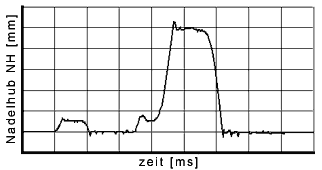
| Questions |
| CR injection system |
| VR injection system |
| PDE injection system |
| Quick guide |
| The radial-piston distributor fuel-injection pump |

Radial-piston distributor fuel-injection pumps are used in direct-injection high-performance diesel engines in private vehicles as well as in the light and medium commercial vehicle sector. An output of 25 kW per cylinder can be reached. Through the exploiting of pressure vibrations in the injection pipes, nozzle-side peak pressures of up to 1750 bar can at present be attained. These high injection pressures assure a fine atomization of the diesel fuel, and so lead to practically complete combustion. The injection pressure is generated dependent on the engine speed in this cam driven system, i.e. when the speed increases, the pressure increases proportionally. The supplying of the fuel from the tank to the pump occurs via a fly pump, which is integrated in the housing of the distributor injection pump. The generation of high pressure is performed by a radial piston pump with a cam ring and from two to four radial pistons (depending on the make). The amount injected is controlled via the duration of closing of the high-pressure magnetic valve; the delivery start is determined by the closing time of the magnetic valve. The adjusting of the injection time in relation to the engine's crank angle is done by the integrated injection timing mechanism. This is adjusted via a clocked magnetic valve. 
|